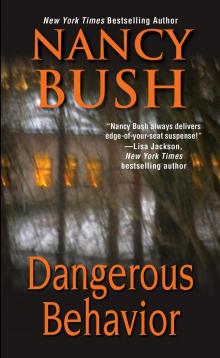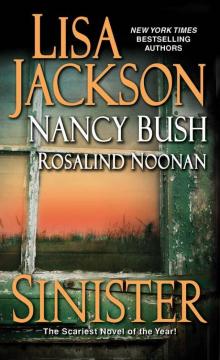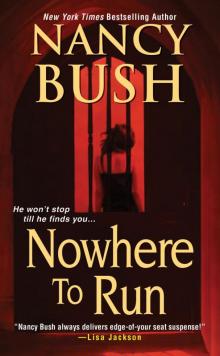- Home
- Nancy Bush
Blind Spot Page 6
Blind Spot Read online
Page 6
“Pain in the ass,” the doctor snarled, then threw up one hand in a gesture for Lang to follow. Lang jumped up and strode to catch up with the man, who turned right and pushed through swinging doors into another green room, this one with a bank of stainless steel drawers, the kind that held bodies. Lang unconsciously held his breath against the odor of death, though there was none. He’d seen his share of dead bodies but it always gave him a moment’s pause; his own particular need for solemnity and the passing of a human spirit.
The drawer ran back with a loud rattle, evidence of his guide’s impatience. Inside was a young man with dark hair, olive skin, and a body slashed and stabbed with knife wounds. An autopsy had been performed to determine cause of death, and the Y of the incision stood out against his sallow pallor.
“Stab wound to the heart did it,” the doctor told him dispassionately. “Not the first wound, but it was the C.O.D.”
Cause of death.
“Anything else?” Lang asked.
“No defensive wounds.”
Lang glanced again at the corpse. A young man. Muscular. He leaned down and looked at his palms. Nothing.
“He was either unconscious or he didn’t want to fight back. He’s got a contusion near his temple. Maybe that incapacitated him and then whoever had the knife just started slashing.”
“Age?”
“Around twenty.”
“And no one’s come forward with any information?”
“Missing persons isn’t looking for this guy. Not a word. He’s off the grid, or no one cares.”
He thought about that as the doctor waited with studied patience. “Got a picture?” Lang asked.
“You’re such good friends with Nunce, get it from him.” He stomped off and Lang was alone. He stared down at the man’s face a long time, memorizing it. Angular cheeks. Black hair, longish.
Young.
Carefully, sensing the quiet of the room, the sharp scents, the feeling of a deep, impersonal institution—exactly what it was—Lang closed the drawer. Even with his effort of quiet, it seemed to clang and reverberate, a harsh metallic sound that spoke of the finality of death.
“Dr. Norris! Jane Doe. Cat…she might be coming to.”
Claire glanced at Alison, then at her office clock. It was almost five. “What’s happening?”
“She’s tense. Gripping her chair. Gibby says she’s talking.”
Claire and the aide shared a look. “I’ll be right there,” she said and Alison nodded and hurried away. It was early, but she might be able to leave after she checked on Cat. There was no pressing reason to stay late, and she’d already spent far too many hours on the job.
Grabbing her coat and tossing her purse strap over her shoulder, she walked briskly down the hall toward the skyway that led to the main hospital and the gallery above the morning room. Descending the steps, she could smell the scents of cooked carrots and potatoes and chicken. The kitchen was preparing the evening meal and tables were being arranged in the morning room. Patients could eat in their rooms or one of several dining rooms, or the morning room, if there were seats available. Claire frowned and headed down the hall toward room 113, Jane Doe—Cat’s—room. Side A of the hospital had three floors; Side B, which housed the criminally insane, sported four floors and two subterranean levels as well.
The door to room 113 was open. Dr. Freeson was staring down at the patient, whose blank face stared right back.
“Alison said she might be coming to,” Claire said.
“Well, you can see that’s not true. Why did Alison go to you?”
“What happened?”
Freeson fluttered a hand. “That Gibson boy was bothering her, so we took them both back to their rooms. Actually, I was just about to call you, so it’s just as well you’re here.” He frowned at the sight of her coat and purse. “There’s a meeting tomorrow morning with the Marsdon family concerning Heyward’s incarceration. I want to make sure you’re available.”
“I’m not available,” she said tightly. “I have patients.”
“Well, rearrange them, for God’s sake,” he said. “This matters, Claire. Eleven o’clock. Avanti will be there, and Neumann, and of course Dr. Radke.”
As hospital administrator, Radke was the big cheese and was also the man in bed professionally with the Marsdons.
“I’m no longer Heyward’s doctor,” she said.
“In Heyward’s mind, you are,” Freeson replied. “I’m not asking, Claire.”
“You never do.”
“You want to take this up with Avanti, be my guest.” Color swept up his neck and his voice tightened. “The Marsdons will be there, too, and the team from Side B: Zellman…Prior…”
Claire could see the pressure was going to be on her to agree to Heyward’s release from Side B to Side A. “Maybe someone from the lockdown section will argue that Heyward should remain with them.”
Freeson looked at her as if she were dense. “Just be there.”
Feeling someone else’s eyes on her, she glanced back and saw that Cat had turned her head and was staring at her. Claire stared back and a frisson slid up her arms in spite of herself. Was there any chance she understood their words? “Hello,” she said.
But the girl’s gaze was in the middle distance. Not on Claire. After a few minutes, she turned back to stare toward the blank television on the wall across from her bed. Claire turned the set on and put the remote near Cat’s right hand, next to the call button. Then she headed out of the room and to the side exit where her car was parked.
Lang sat in his truck, his head against the headrest, eyes closed, ears filled with the pitter, pitter of rain and then sloppy plops when it started pounding in earnest. He opened his eyes. He was in the lot of the Winslow County Sheriff’s Department, parked in a visitor’s spot, nose out. He’d been there an hour. If he stayed much longer he suspected someone would come and knock on his window and demand to know what the hell he was doing. He would, if he worked there.
But he didn’t want to move. He was caught in a funky inertia, the same one he’d battled since Melody’s death. Sometimes he won, sometimes he lost. It had a strong grip that had lessened a bit over time, but still held on hard. He had no family now. He was alone, and a voice in his head kept asking him, What now? What’s next? What’s the point?
Shifting in the seat, he sighed, a sound somewhere between a snort and a groan. He supposed he suffered from depression, although it didn’t completely immobilize him. In fact, given the slightest chance to get Heyward Marsdon a guilty verdict and send him to the big house, he’d be sprinting down the halls to do that.
He glanced toward the sheriff department’s front doors. He’d called for the sheriff again, but had been told the man was out. Lang figured Nunce must still be on vacation, because he was never in. He was asked, again, if he wanted to speak with someone else, but Lang had once again declined. Going to see the medical examiner, pretending that he’d talked to the sheriff, that maybe hadn’t been wise for positive relations with the department; however, he didn’t regret it. What the hell. Sometimes you just had to forge forward in life, and he hadn’t been particularly good in that regard lately.
Although he’d overstepped bounds all over the place and if he were caught, had no backup plan, he didn’t much care. Part of his “depression,” no doubt, but he kinda thought his very lack of interest was the reason he’d gotten past the ME. He wasn’t desperate or pushy, didn’t want anything really, and so he’d raised no alarm. If he wanted to see the John Doe’s body, it was fine, fine, fine. No reason to call the sheriff and check. Just go goddamn look at it already, and get out.
The dead man’s image crossed the screen of his mind. The stitched Y-cut from the autopsy. The muscular build. His youth. No defensive wounds…
Why hadn’t the guy fought back? What had stopped him? Did he know his attacker? Was he unconscious before the knife attack began?
Lang knew the man had been found by a trucker, but unless he look
ed at the case file he wouldn’t know the trucker’s name and/or how to get hold of him. Not that he really cared to talk to the man. Not that he had any authority to get involved.
“Not my case,” he said aloud.
Yet he was mildly intrigued. Mildly.
“Nobody likes interference,” he added. “Curtis knows better.”
Yet his partner, the bastard, had intrigued him.
Maybe it was a good thing. Time would tell.
The rain had turned his windows into a moving rain splatter and now he was insulated from view behind a gray fog of condensation, cocooned within the vehicle. Lang thought about the Jane Doe who’d been released from Laurelton General to Halo Valley Security Hospital.
Halo Valley.
He closed his eyes, breathed quietly for several moments, then opened them again. Halo Valley Security Hospital was a private institution where special funds were set aside for worthy cases. The Marsdon family being a major contributor to the hospital and the special funds made it a good bet concessions had been made for Heyward Marsdon III, yes, but the hospital served an altruistic purpose, too. Cases that might have normally been assigned to the Oregon State Hospital in Salem, the state-run facility, sometimes ended up at Halo Valley, easing costs to the state and maybe even giving the patient more intensive care.
Not that Lang would ever be a fan. Given what had happened to his sister on Halo Valley grounds, and the choices that had been made by Halo Valley staff, particularly Dr. Claire Norris, he was never going to feel all warm and fuzzy about the place. But Halo Valley was where the pregnant rest stop victim had been taken, so if he kept with this case, it might be a place he was destined to visit.
The idea brought a cold chill to his skin.
So why was he parked outside the Winslow County Sheriff’s Department? Why was he listening to Trey Curtis? Why did he feel oddly committed to a case that had nothing—nothing—to do with him? Why this case? Why now?
Lang’s hands flexed on the wheel for a moment, then he threw open the door and stepped into the rain, jamming a baseball cap on his head and watching rain slide down the shoulders of his black leather jacket. He should have worn a raincoat. He shouldn’t be on this mission. He should have stayed home and watched daytime television.
It was raining the day Melody died, too. An incessant, chilling precipitation thrown around by the hand of the wind. She’d stopped by to see Lang at work, her hair wet, her face flushed from cold, raindrops sparkling under the department lights. He’d been on his way out and she’d said she wanted to talk to him. She wore a thin jacket, a summer jacket, and he could see the bare skin of her wrists and a little up her forearms. Thin, red welts showed where she’d scratched herself. Even in those few moments she couldn’t stop the compulsive tearing at her own skin. He’d been worried. They agreed to meet at the house as soon as Lang was off, about three hours later. Melody had long ago moved out and been on her own. She’d been a bright star once, someone who seemed to know what she wanted. Someone in control of her own life. But things had deteriorated and Lang had tried to get her to come home to no avail. He knew about Heyward Marsdon, knew of his family and a little of his problems. Initially, he’d foolishly been relieved and happy when his drifting sister had connected with someone from a solid family. He’d felt hopeful, like she might actually pull it back together. Have a normal life. A good life. Naivete at its worst. He knew better. He’d seen enough through his years on the force to know better, but when it came to Melody he just wanted to believe in good things so badly.
She never made it to his house. He tried calling the cell phone number he had for her, but it was not hers any longer. He went to an old apartment address, but it was empty and the neighbor lady said she thought the woman who’d lived there had been evicted for nonpayment.
Kicking himself for not just leaving work with her when she stopped by, Lang tried getting in touch with the Marsdons and was coolly ignored. No, they didn’t know where Heyward was. No, they had no phone number for him. No, they had no idea who his friends were. And they would appreciate not being bothered again.
And then…merely an hour later…the emergency call from Halo Valley Security Hospital was logged into 911. He’d heard the tapes enough times. A guard, Wade De-Bussy, was holding down Heyward Marsdon, and one Dr. Claire Norris was saying that a woman named Melody Stone was dead.
Paranoid schizophrenia, they told Lang. Hallucinations and delusions. Unpredictable behavior. But no one, no one, believed Heyward Marsdon would kill anyone. Certainly not Heyward Senior or Junior, who were chock full of disbelief. Why, Heyward III had just been at the governor’s ball with his loving family. Yes, he’d had bouts of depression in the past, but this was entirely unprecedented. Unbelievable. There were undoubtedly mitigating factors to explain the psychological break. Drugs, maybe? He was never that sick.
Well, at least that was the beginning spate of excuses until Heyward Senior, who was the old man pulling the strings, saw that he’d better go for the insanity plea or his grandson would be heading straight for serious prison time. Lang suspected Heyward Marsdon Sr. was practically choking on the diagnosis for his only grandson. Heyward III’s father was like a pale shadow following the old man around and didn’t seem to have any say, one way or the other. A disappointment to his old man? Maybe the reason Heyward Senior was pinning his hopes on his schizophrenic grandson, no matter the evidence to the Third’s sickness?
It didn’t matter. None of it.
The upshot was that Lang hadn’t been there for Melody. A couple of hours on the job when he should have been with his sister. A couple of hours…that’s all.
So he quit. Just up and quit. Couldn’t do it anymore. Couldn’t go to his old desk and remember how he’d turned Melody away when she’d needed him. Since then he’d had six months of idle time and one job offer from the Tillamook County Sheriff’s Department, the law enforcement agency that held Halo Valley Security Hospital within its jurisdiction. Strange how the world worked. Ironic. He’d met with Tillamook County’s sheriff and had hit it off sometime the spring before, and the job offer came in just about the time he quit the Portland P.D. He’d turned them down, but like Drano, the job had yet to be filled. At this point he didn’t even know if he wanted to go back to law enforcement anywhere. Yet here he was, stepping forward through the rain to the Winslow County Sheriff’s Department, working a case he had no business being involved with.
Now, stepping inside the department’s front doors, he glanced through bulletproof glass at the receptionist whose name tag read Dot Edwards. She smiled at him and said, “That’s one wet coat ya got there.”
Lang glanced at his jacket. It was soaked. “It was dry when I was at the ME’s.”
“You came from there?”
He nodded. “Sheriff still not in? I’m Langdon Stone. Ex-homicide with Portland P.D.”
“Ex,” she said.
“Long, ugly story.”
Dot hesitated, then gave Lang a slow, negative wag of her bleached blond head.
“Thought I’d check,” Lang said, turning to leave.
“Wait a sec. Detective Tanninger might be able to help you. He’s, like…the man everyone wants to see?” She reached for the phone.
“Is he in?” Lang asked, pausing.
She smiled and said into the receiver, “Could you check with Detective Tanninger? There’s someone here to see him. Ex-detective…?”
“Langdon Stone, formerly homicide Portland P.D.”
She repeated the information, then hung up a moment later. “Go on through,” she said, touching a buzzer.
Lang pushed through the door, feeling a little like Alice falling down the rabbit hole. He didn’t know what he was doing and what he would find, and it was an adventure he maybe should have reconsidered before embarking upon.
He walked down a short hallway and then was in the squad room. Several sets of eyes turned to him, but most of the desks were empty. “Tanninger?” he asked, and was pointe
d toward a corner. He turned it just as a tall man in the tan uniform of the sheriff’s department appeared from an office.
He stopped upon seeing Lang, and the two men sized each other up. Detective Will Tanninger—per his name tag—was one of those strong, silent types who observed more than talked. Lang thought about trying to bamboozle the man for about half a second, figured it wouldn’t work, said instead, “Detective Trey Curtis, my ex-partner at Portland P.D., wanted me to jump-start my stalled investigative engine by interesting me in one of your cases. The rest stop one. So, here I am, insinuating myself into your world. Feel free to kick my ass out of here.”
Tanninger half-smiled. “The truth. Interesting approach.”
“I came here to talk to the sheriff, but he’s not here. Dot at the desk suggested I meet with you.”
“Sheriff Nunce planned to retire but no one wanted him to. He was reelected, but when he’s not around I’m the next man.”
“Maybe that happens a lot?” Lang suggested.
“Maybe it does.”
“So, do you want some help, or am I wasting my time and yours?”
“I know Trey Curtis. Of him, anyway. And Drano.”
“You know Drano?”
“We got a call from him, too. Wanted us to encourage you. Said you were a hell of an investigator. Sang your praises. Twisted our arms as hard as he could.”
Lang said wryly, “I’m a charity case.”
“According to them, you’re the man for the job, and if this case just so happens to kick you back into gear, everybody wins.”
“Well…” He wasn’t sure what to think of that.
Tanninger said, “If you’re as good as they say you are, jump in. Even if you’re not. We’re short-staffed right now. This damn flu has decimated us and Nunce is out sick.”
Funny. Lang’s lie to the ME was turning out to be the truth. “How long’s he been out sick?”
“A while. Maybe a while more.”
“Vacation. Sick. And still one foot in retirement?”
Tanninger shrugged and said instead, “One of our best took a bullet last year, and though she’s recovered, she’s about all we’ve got for this case. And she went home early with a cough.”

 Jane Kelly 01 - Candy Apple Red
Jane Kelly 01 - Candy Apple Red Jane Kelly 03 - Ultraviolet
Jane Kelly 03 - Ultraviolet The Gossip
The Gossip Dangerous Behavior
Dangerous Behavior Blind Spot (2010)
Blind Spot (2010) Sinister
Sinister Candy Apple Red
Candy Apple Red The Princess of Coldwater Flats
The Princess of Coldwater Flats Blind Spot
Blind Spot Valentine's Child
Valentine's Child You Don't Know Me
You Don't Know Me Miracle Jones
Miracle Jones I'll Find You
I'll Find You Dear Diary
Dear Diary Jesse's Renegade (#3 of the Danner Quartet)
Jesse's Renegade (#3 of the Danner Quartet) The Princess and the Pauper
The Princess and the Pauper Jealousy
Jealousy Hush
Hush Electric Blue
Electric Blue No Turning Back
No Turning Back Nowhere to Run
Nowhere to Run Ultraviolet
Ultraviolet Unseen
Unseen Lady Sundown (#1 of the Danner Quartet)
Lady Sundown (#1 of the Danner Quartet) The Killing Game
The Killing Game